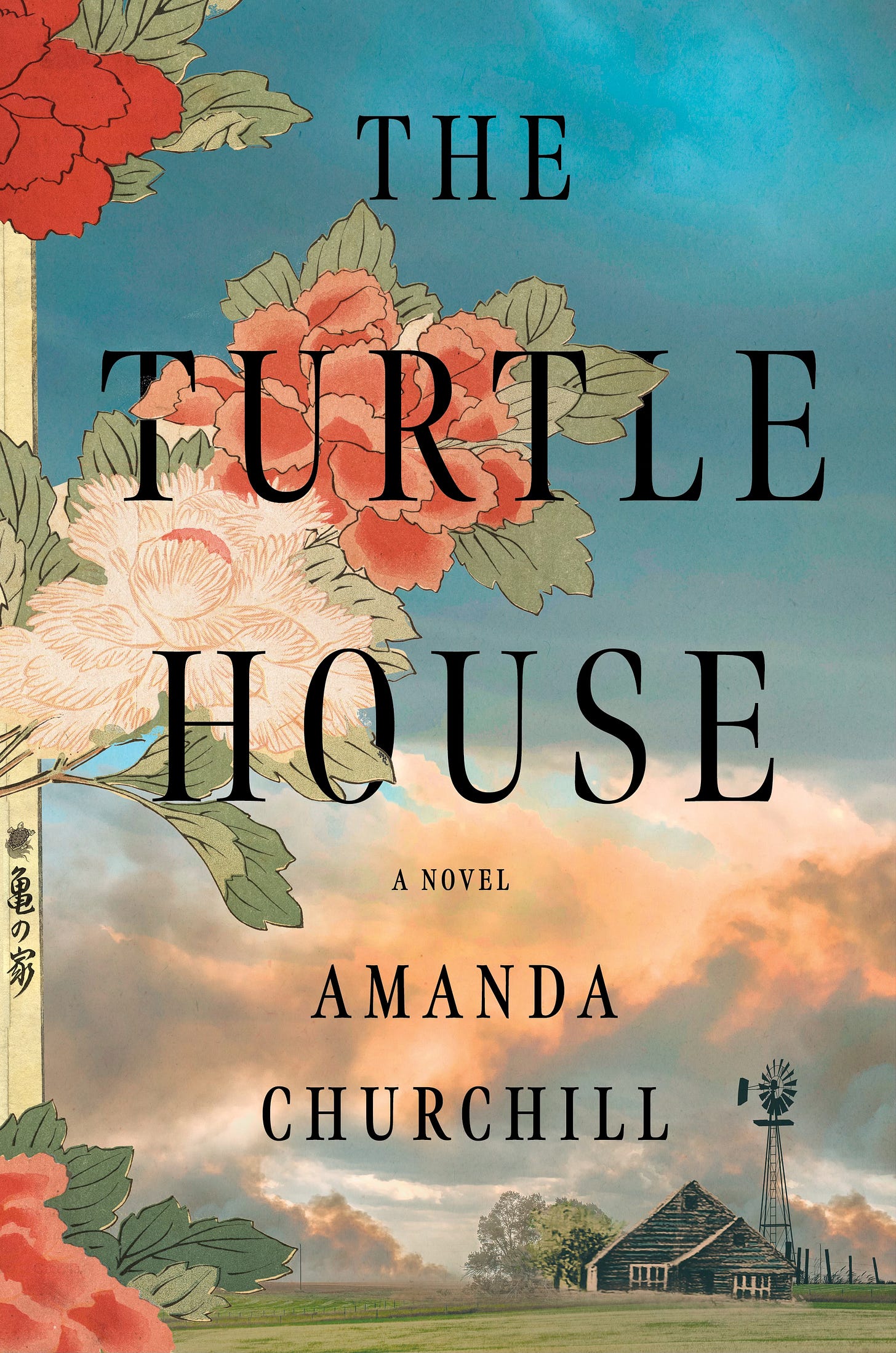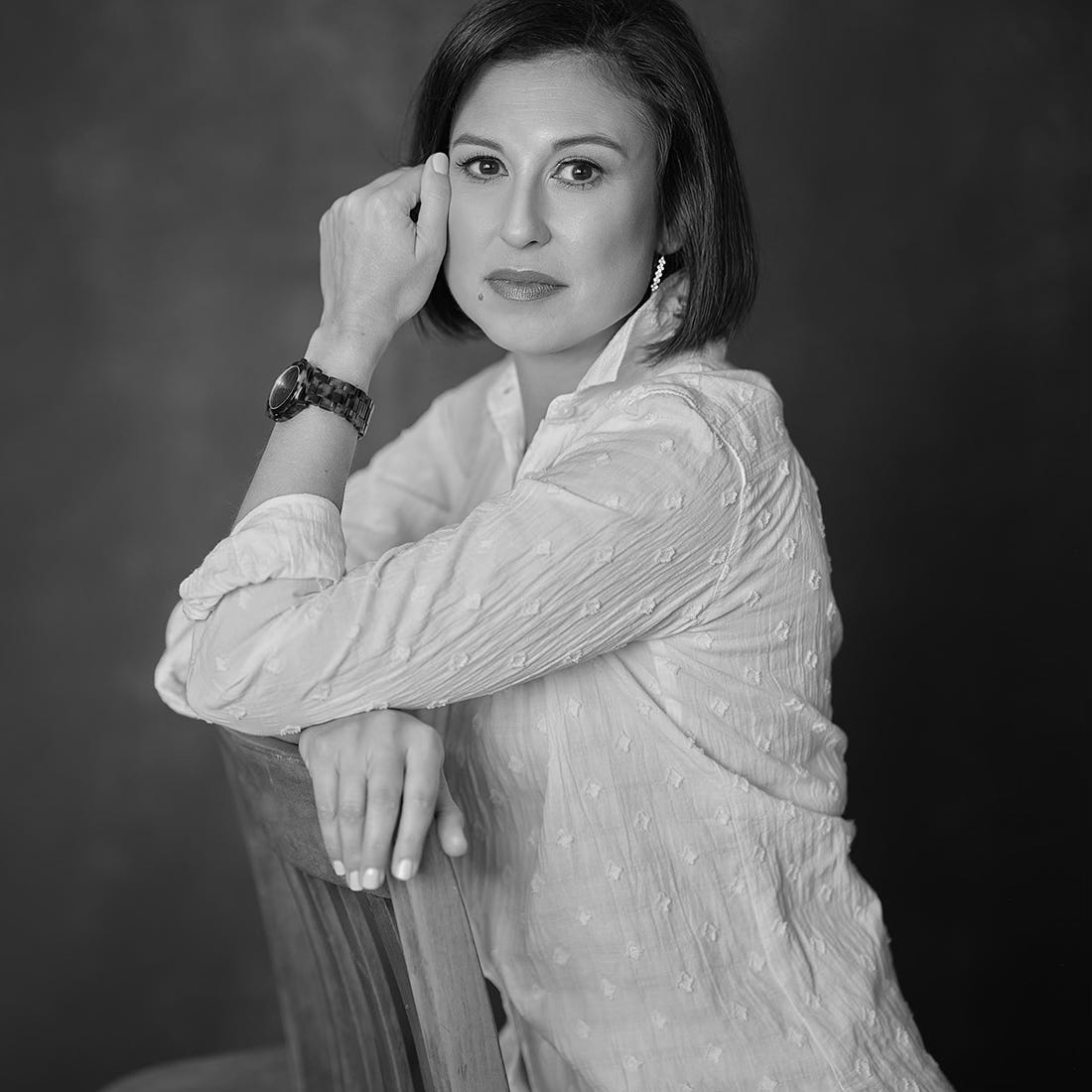Interview with Amanda Churchill
I don’t know Amanda Churchill, but in 2020 we were both in StoryBoard workshops and I remember her from a large group session. I think we were encouraged to dress up and she wore a cow costume. It was adorable and charming, but maybe that memory isn’t real. Maybe she just had a farm themed Zoom background? I don’t know, but I do remember her big smile and thinking she seemed like such a genuine, sweet, and fun person. I was excited to read her debut novel, The Turtle House.
The novel is set in spring 1999 and alternates between two timelines and perspectives. We’re first introduced to twenty-five-year-old Lia, and quickly meet her current roommate: Lia’s seventy-three-year-old grandmother Mineko. This intergenerational tale, places Mineko leaving Japan as a war bride (the historical aspects are inspired by Amanda’s own grandmother’s life), next to Lia’s struggles as a female architect. The result is a beautiful and tender story about gender, family, identity, and what home means.
I’m so happy Amanda agreed to this interview!
Can you share The Turtle House's journey to publication? I'd love to hear about the highs and lows of bringing this novel into the world.
The journey to publication was long. I started this novel in spring of 2014, after my grandmother, who was the inspiration for this book, passed away. I had a four-year-old, a newborn with colic, and I missed my grandmother. Basically, I was a little bit of a mess. I started writing my grandmother's stories down, fictionalizing the parts that I didn't know, to help cope with some of the sadness (and post-partum depression) I was experiencing. I did this for years and years, slowly, early in the mornings before the kids woke up. I was working full time and writing other short stories and pieces of flash fiction at the time, but my one true project was this work, which slowly began to congeal into a novel. It was incredibly hard and I would often ask myself why I was even struggling to make the time to do this, when time was so precious to begin with. It very much felt like I was pouring out perfectly good water into the desert.
After some years, I realized that what I needed was another through-line and I also needed some structure. That kind of writing required longer stretches, so I started taking entire Fridays to do this. I'd work to get all of the graphic design work done at the beginning of the week, hire a babysitter for the baby, send the older child off to preschool and write at a coffee shop until my timer would go off... then, I'd race to get the preschooler, race home to relieve the sitter, get everyone down for a nap, then start working again. I could piece together nearly six hours of writing time doing it this way, and I was able to get deeper into the novel on these magical, somewhat expensive, Fridays. This whole time I was applying to all the things that everyone applies for... grants, scholarships, conferences. I'd refresh my email like a lunatic, waiting for someone to see me. I was rejected a TON. Like, so much that when I added up all of the application fees to somehow write off my taxes, I could have bought something really, really nice for the house for that money. Like a fancy blender. Maybe two fancy blenders. But, eventually, as I began revising and sending out pieces of this novel out, I started receiving the word "yes" in my inbox, which was invigorating. Finally, in 2021, I felt I was ready to find an agent. This is where some luck came in— I had met a dear friend at a conference who had signed with my agent and then suggested I submit my work to her. I added her name to the list of the first ten agents I was going to query and... she liked my work. During our first meeting, I felt like she understood me and could envision what I was trying to accomplish with my novel, even if all of it wasn't perfect yet. I finally had someone who was 100% in my corner and had some insight. I seriously followed her lead after that. There are not many people I trust like I trust my agent. If I had another kid, I'd probably name it after her. From there we revised and revised again... then six months later, we went out on submission. The actual submission happened when I was in Disney World with my family, so I was literally refreshing my email (again— I do that a lot) while in line for the tea cup ride and the Runaway Mine Train. After a few weeks, The Turtle House went at auction to Sarah Stein at Harper and I was in shock. I couldn't believe that after all that time, I was going to have a novel in the world.
The historical aspects of the novel are inspired by your grandmother and you interviewed her, but note in the acknowledgements you had to do additional research. I'm curious about that process and how you balanced the research and writing.
The balance was hard until I heard something at One Story's summer conference in 2019. Irina Reyn and Hannah Tinti were talking about craft and one of them— I can't remember who— said that it was important to be "vampiric" about one's research. I think Irina said that she did her writing and was very careful to research exactly what she needed, like a vampire sucking blood. Something about that image stuck with me all these years. So, when I came across something that I did not know, I would start my search for exactly what I needed, research for a while, and then get back to the work. It kept me on track towards a finish line. Then, after a draft was completely done, I was free to geek out on all the research, with the hope that during the next revision, whatever I was sticking into my brain would come back out onto the page in an interesting way.
I love when acknowledgements are filled with pages of people who helped support a book in some way, which is the case in this novel. How important was your writing community in helping support you finishing and publishing The Turtle House?
My community is everything to me. I have loved meeting writers over the years and keeping up with them. A few have become best friends. I took so long getting to this place of publication, I sometimes thought that if all I ever got out of all these conferences was a pack of interesting, brillant, talented friends, then that was a pretty good trade-off. So, I went into every event, every Zoom class, every encounter with that thought in mind: let's see who is nice, who would make a good buddy, and who needs me, also, as a friend. I think that's how I kept sane through 10 years of writing, revising, editing and publication. It's how I'm approaching the promotion of this book, too. I have no idea how this thing is going to sell. But, I'm going to get out there and meet readers, booksellers and other writers and just see who I meet and what we have in common. It's been a fun way to approach something that can be very emotionally taxing and keeps me out of the comparison game.
Can you share some reading recommendations?
Oh, goodness, yes. I feel like I can never shout enough about work I love. Right now, I'm really into reading another Texas writer named James Wade. I have his ARC for his next novel, Hollow Out the Dark, which is this gritty prohibition story, set in east Texas, but has the most lovely language. Another book I can't tell enough people about is Janika Oza's A History of Burning— it is an epic, it's a family story, it takes place on three different continents, there's beautiful language and wonderful characters. Winning all the way around. A collection of stories that I've loved recently(ish) is Andrew Porter's book, The Disappeared. He just has a way of crafting a short story that is so beautifully introspective but also engaging. Finally, I have Praisesong for the Kitchen Ghosts by Crystal Wilkinson on my dining room table and I will read a chapter and look at a recipe and then ponder what I learned and how I felt while reading for a few hours. I've been snacking on this one. It's such a beautiful book and one that defies genre— it's a memoir, it’s history and it’s recipes.
Is there a song that ties into your novel in some way?
There's a song that I've loved for years by Miranda Lambert called “The House that Built Me.” It's a beautiful song and I remember listening to it on repeat when it came out. It's about someone who goes back to their childhood home, which is now owned by someone else, and wants to see it again just to remember what it felt like to believe in the world. I find that it's very Lia-esque (the granddaughter in my novel) because she's someone who has gone out with such big dreams and has an encounter that sends her back to her parents and her hometown. For anyone who has boomeranged back to the room they grew up in (I did!) with a broken heart because of the world, I think this song and this character is for them.
Thank you, Amanda!




Ordering this book! Thanks Rachel.❤️
Great interview!! I can relate to both the difficulty and the beauty of writing something so personal (my only published novel was a tribute to my grandmother). And I find so much hope in this agent-to-auction story as well as the community-minded focus. I am currently waiting to hear back on a full request for my memoir, and the number of false starts I've had with other projects seem countless, but I believe in this one in a different way. Thanks for reminding me that things can shift in an instant. I appreciate the infusion of hope, and I look forward to reading this beautiful book.